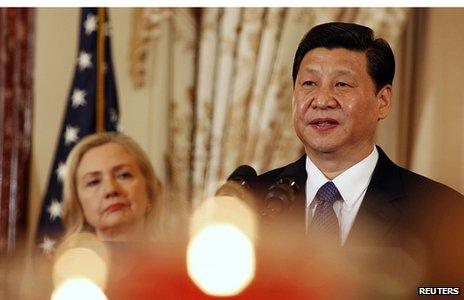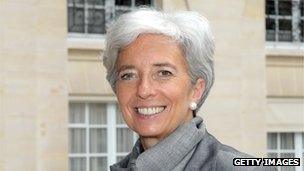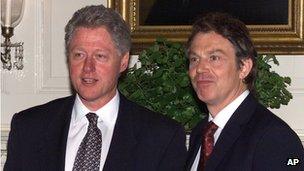Xi Jinping Iowa visit echoes past trips by future stars
- Published

The young Chinese who visited an Iowa household in 1985 is expected to lead the word's most populous nation by the end of 2013
Xi Jinping - expected to be the next president of China - is returning to the Iowa he visited as a young man. He is far from the only foreign leader to have spent time in the US before they were powerful.
On Thursday, Chinese Vice-President Xi Jinping will visit Muscatine, Iowa - the same city he visited as a 31-year old in 1985.
"I thought he was a very nice, focused, polite man," Eleanor Dvorchak, who hosted Mr Xi at her home during his stay, told the BBC.
"A handsome young man, and now he's a handsome older man. It was a pleasure to have him at the house."
Mr Xi felt similarly, as evidenced by his request to add Muscatine to his US agenda.
In December, Iowa governor Terry Branstad recalled a recent conversation, external with Mr Xi.
"He had the itinerary from his visit here 26 years ago," Mr Branstad - who was also governor at the time of Mr Xi's first visit - told public radio's The World.
Mr Xi had travelled to Iowa for as part of a Chinese delegation looking to learn more about American agriculture.
"He said: 'I was in your office at the state capitol of Des Moines, on the 26th day of April, 1985,'" Mr Branstad recalled.
"And he said he stayed with a family down in Muscatine who had two sons in college and a 13-year-old daughter. He was very impressed with the friendliness, the hospitality, and the way he was treated in Iowa."

Current IMF boss Christine Lagarde once interned for a congressman
Those positive memories, created 30 years ago, could yet pay dividends to the US.
"If he came away from those earlier days with a good impression, that will certainly affect how he views policy as vice-president," says Philip Seib, director of the University of Southern California Center on Public Diplomacy.
The value of hosting international visitors as part of an academic, cultural or political exchange is vast for the host country, he says.
"It's an enormous benefit. It strips away some of the mythologies that poison people's opinions about a country if they're negative. They give a chance for the visitors to meet citizens, meet average people, so the country becomes not a news-media-produced abstraction, but real people.
"That generally works out quite well."
'Profound effect'
To that end, there are several programs in the US that help promote international diplomacy through exchanges.
Ban Ki-moon, the current head of the United Nations, was an exchange student in California in 1962. There, the 18-year old stayed with a school teacher and her husband, who remember that Mr Ban told them he wished to become a diplomat, external.
The head of the International Monetary Fund, Christine Lagarde, spent her senior year at a private school in Bethesda, Maryland, where she interned for US Congressman William S Cohen in 1974.
According to the Washington Post, external, Ms Lagarde was tasked with translating mail sent from Mr Cohen's French-speaking constituents in Northern Maine during the height of Watergate.

Tony Blair participated in a diplomatic trip to the US, while Clinton studied at Oxford
Coming to America for study can be powerful.
"It's a very profound effect. It's life-long," says David Beiser, director of Ayusa, a non-profit cultural exchange and study-abroad organisation for high school students.
He cites the Kennedy-Luger program, which sponsors students from predominantly Muslim countries to study in the US.
"Students who have returned from a year in the US on the Kennedy-Luger program have a 77% more positive view of the US than they did before," says Mr Beiser.
Long history
Of course, when it comes to international relations, a youthful trip to the US is hardly the end of the education.
In his memoir, A Journey, former UK Prime Minister Tony Blair said that his experiences in the US, including a diplomatic exchange, left him with the early impression that he knew America.
"I had made a tour for a month in 1986 which the government had provided for up-and-coming politicians. I had even seen the Charleston Regatta, and Jerry Lee Lewis play live!" he wrote.
However, he said, it was not until he left the office of Prime Minister in 2007 that he began to fully understand the United States.
"The reality was, I was woefully ignorant," he wrote.
And while current UK Deputy PM Nick Clegg has fond memories, external of taking a cross-country road trip during his stint in America, he also campaigned in 2010 on the idea that America and Britain's "special relationship" was too one-sided in favour of the US.
Mr Clegg spent the 1989 school year at the University of Minnesota, then worked for Christopher Hitchens as a fact-checker in New York City.
It is also not clear whether Mr Xi's fond memories will be enough to make a significant difference in the future of US-China relations.
After all, he is not the first Chinese dignitary to spend some of his early career in the US.
The state department cites dozens of leaders who have travelled to the US on diplomatic exchanges, including Vice-Premier Li Keqiang, who came on a 1988 exchange when he was 33.
The current president of Taiwan, Ma Ying-jeou, also took a trip to the US as a young man. In the early 1970s, the 21-year old travelled to the country as part of the state department's International Visitor Leadership scheme.
He also spent years in the US as a student at New York University and Harvard Law School.
But Ms Dvorchak, who hosted Mr Xi so many years ago, is optimistic that her former house guest's visit in the 1980s will help enhance the US-China relationship.
"Before anything can get accomplished, two entities have to be talking," she says.
"It went well in '85 and I'm sure everything will go well today."
- Published15 February 2012
- Published15 February 2012
- Published14 February 2012
- Published14 February 2012